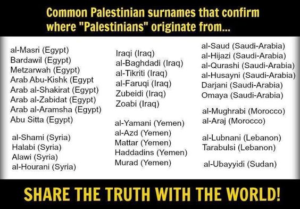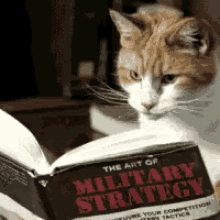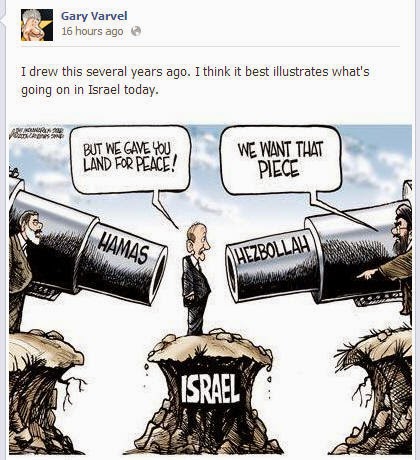The Tribal update presents a song for Yom Haatzmaut, Tawil Fadiha, and Kim Jong On |
Caroline Glick: The presence of Jews on the West Bank has nothing to do with prospects for peace |
קרולין גליק – לוחמת הסברה ציונית – רשימת הימין החדש |

Column One: Israel: The happy little countryNetanyahu thought a moment and said, “I’d like to be remembered as the leader who preserved Israel’s security.”By CAROLINE B. GLICK, The Jerusalem Post As Independence Day celebrations were winding down Tuesday night, Prime Minister Binyamin Netanyahu made a guest appearance on Channel 2’s left-wing satire show Eretz Nehederet. One of the final questions that the show’s host Eyal Kitzis asked the premier was how he would like to be remembered after he leaves office. Netanyahu thought a moment and said, “I’d like to be remembered as the leader who preserved Israel’s security.” On the face of it, Netanyahu’s stated aspiration might seem dull. In a year he’ll be the longest-serving prime minister in the state’s history, and all he wants is to preserve our national security? Why is he aiming so low? And yet, the studio audience reacted to Netanyahu’s modest goal with a thunderclap of applause. After pausing to gather his thoughts, a clearly befuddled Kitzis mumbled something along the lines of, “Well, if you manage to make peace as well, we wouldn’t object.” The audience was silent. The disparity between the audience’s exultation and Kitzis’s shocked disappointment at Netanyahu’s answer exposed – yet again – the yawning gap between the mainstream Israeli view of the world, and that shared by members of our elite class. The Israeli public gave our elites the opportunity to try out their peace fantasies in the 1990s. We gave their peace a chance and got repaid with massive terror and international isolation. We are not interested in repeating the experience. We will be nice to leftists, if they are polite. We might even watch their shows, if there’s nothing else on or they are mildly entertaining. But we won’t listen to them anymore. This is why US President Barack Obama’s visit last month had no impact on public opinion or government policy. Obama came, hugged Netanyahu and showered us with love just like Bill Clinton did back in the roaring ’90s. He praised us to high heaven and told us he has our back. And then he told us we should force our leaders to give Jerusalem, Judea and Samaria to our sworn enemies even as they teach their children to aspire to kill our children. And we smiled and wished him a pleasant flight home. Obama had no idea what he was getting into when he came here. Like Kitzis and his colleagues on Channel 2, Obama surrounds himself with people who, like him, prefer fantasy to reality. In Obama’s world, Islamic jihad is about the West, not about jihadists. In Obama’s world, the most pressing issue on the international agenda is apartments for Jews in Jerusalem and Efrat. And in Obama’s world, what Israelis need more than anything else is for leftist Europeans to love us. Talk about retro. But a lot has changed since the 1990s. Twenty years after Yitzhak Rabin shook Yasser Arafat’s hand on the White House lawn and so officially ushered in Israel’s Age of Terror, most Israelis don’t really care what the Europeans or the Arabs think of us. The Europeans prattle on about Israeli racism, and threaten to put yellow stars or some other nasty mark on Israeli goods. They ban Israeli books from their libraries in Scotland. They boycott Israeli universities, professors and students in England. In Italy they hold rallies for convicted mass murderer Marwan Barghouti at their national Senate. And in France they butcher Jewish children. And then the likes of Catherine Ashton expect us to care what they think about us. Well, we don’t. For their part, Americans are bemoaning the resignation of the unelected Palestinian Prime Minister Salam Fayyad, and insisting that he was a true partner for Israel, who just couldn’t make a go of it due to forces beyond his control. While most recognize Fayyad’s departure has nothing to do with Israel, some US pontificators have blamed Israel for Fayyad’s failure. Elliott Abrams, for instance, wrote, “Israeli governments also gave him less cooperation than he deserved.” To that we answer, Fayyad was nothing more than a Western delusion, like Arab peace with Israel. Fayyad didn’t have a chance of leading the Palestinians because he never personally killed a Jew. And the Palestinians only accept murderers as their leaders. But the fact that he never killed a Jew personally didn’t render Fayyad a partner for Israel. Fayyad dutifully used donor funds to pay the salaries of terrorists in Judea, Samaria and Gaza every month. He led the Palestinian branch of the boycott, divestment and sanctions war against Israel. He made working for Israelis and buying Israeli goods criminal offenses. Fayyad personally led raids into private homes to inspect people’s refrigerators to see if they had Israeli cottage cheese on their shelves. He organized and attended bonfires where they burned Israeli goods. Not to put too fine a point on it, but this is not the sort of behavior you would expect a peace partner to engage in. The Americans who insist on mourning Fayyad’s departure refuse to accept the obvious fact that Palestinian aspirations for statehood are a cheap, shoddy, for-export-only Arab product. The Palestinians don’t want a state. They want to destroy Israel. Unable to accept this basic fact, the Americans invent lies like Fayyad-as-peace partner and try to shove them down Israel’s throats. Well good riddance, Salam Fayyad. Obviously Fayyad is not the last word in Western delusion. They will think of a new perfect solution to replace him in short order. But in their endless search for the next silver bullet, the Europeans and the Americans and their Israeli followers miss the fact that the easiest way to build a secure and peaceful world is not by wooing terrorists. The best way to achieve these goals is by accepting the world as it is. This is what the Israeli people has done. True, we needed to have our fantasies blown away in suicide bombings before we reconciled ourselves to this simple truth. But life has been better, happier and more secure since we did. The “international community’s” inability to accept that sober-minded contentment is better than pipe dream fantasies has caused leftist writers in Israel, Europe and the US alike to express mystification at a recent survey carried out by the OECD, which ranks Israelis among the happiest people in the world. The ranking made no sense to commentators. Israelis work harder than other members of the OECD. We complain more than other members of the OECD. We don’t have “peace.” And yet, we are among the happiest people in the OECD. What gives? For decades before we embarked on the phony peace process, Israel was a model socialist state. We had paralyzing tax rates and failed government industries that crowded private entrepreneurship out of the market. Monopolies ran every sector and provided shoddy goods and horrible services at astronomical prices. The Histadrut labor union owned most of the economy along with the government and in every sector, Histadrut commissars ensured that anyone with an ounce of initiative was subject to unending abuse. Nirvana. Just around the time we began extricating ourselves from our socialist straitjacket, we were also recognizing that the peace thing wasn’t everything it was cracked up to be. And at that point we began to understand that happiness and success aren’t about what other people give you – money, treaties, a phone line after a five-year wait. Happiness and success are about what you accomplish. At that point, sometime between 1996 and 2000, Israelis began creating large families and embracing the free market. Today, with an average of three children per family, Israelis are the fecund outliers of the industrial world. And as David Goldman at PJ Media has demonstrated, there is a direct correlation between children and human happiness. This is why fruitful Israelis have the lowest suicide rate in the industrial world. When you have children, you have a future. And when you have a future, you work hard to secure it, and have a generally optimistic outlook. What could be so bad when your kid just lost his first tooth? Israelis are also happy because we see that we can build the future we want for our families and our country even without another glitzy signing ceremony at the White House every six months. Our country is getting stronger and more livable every day. And we know it. Those on the international stage that share our view that life is about more than pieces of paper signed with Arab anti-Semites recognize what is happening. For them Israel is not “that shi**y little country.” It’s “The Little Engine that Could.” Take the Chinese. Last July China signed a deal with Israel to build an inland port in Eilat and a 180- km. freight railway to connect Eilat to Israel’s Mediterranean ports in Ashdod and Haifa. The purpose of the project is to build an alternative to the Suez Canal, in Israel. The Chinese look at the region, and they see that Egypt is a failed state that can’t even afford its wheat imports. The future of shipping along the Suez Canal is in doubt with riots in Port Said and Suez occurring on a regular basis. On the other hand, Israel is a stable, prosperous, successful democracy that keeps moving from strength to strength. When the freight line is completed, as far as the global economy is concerned, Israel will become the most strategically important country in the region. Then there is our newfound energy wealth. Israel became energy independent on March 30, when the Tamar offshore gas field began pumping natural gas to Israel. In two to three years, when the Leviathan gas field comes online, Israel will become one of the most important producers of natural gas in the world. Moreover, in 2017, Israel will likely begin extracting commercial quantities of oil from its massive oil shale deposits in the Shfela Basin near Beit Shemesh. Geologists assess that the field alone contains some 250 billion barrels of oil, giving Israel oil parity with Saudi Arabia. Chinese, Russian and Australian firms are lining up to sign contracts with Israeli energy companies. International analysts assess that Israel’s emergence as an energy power will have a stabilizing impact on the global economy and international security. Israel can end Asia’s oil and gas hunger. It can reduce European dependence on Russia. It will remove OPEC’s ability to dictate world oil prices through supply manipulation. Israel’s discovery of its energy riches couldn’t have come at a more propitious time. Had Israel discovered its oil and gas 65 or even 20 years ago, we wouldn’t have had the economic maturity to manage our resources responsibly. But now, with our free market, our hi-tech sector and our entrepreneurial culture, we can develop and manage our resources wisely and successfully. At 65, Israel is becoming a mature, responsible, prosperous and powerful player in the international arena. The only thing we need to ensure that we enjoy the fruits of our labors is security. And the one thing we can do to squander it all is place our hopes in “peace.” And so we won’t, ever again. |

Caroline Glick: Mike Pompeo Destroys the Ideological Legacy of Obama’s Middle EastBy Caroline Glick 14January2019 https://www.breitbart.com/national-security/2019/01/14/caroline-glick-mike-pompeo-destroys-the-ideological-legacy-of-obamas-middle-east/ From the moment that President Donald Trump entered office two years ago, he has been stripping away his predecessor Barack Obama’s legacy in the Middle East, piece by piece.It hasn’t been easy. It took Trump a year to finally overcome the opposition of the professional bureaucracy at the State Department and the Defense Department, and overrule the opposition of his then-Secretary of Defense James Mattis and Secretary of State Rex Tillerson to recognize Israel’s capital, Jerusalem. Trump had to overcome further opposition from his senior advisors and the consensus view of the foreign policy establishment to move the U.S. Embassy in Israel to Jerusalem. So too, to walk away from Obama’s signature foreign policy, his 2015 nuclear deal with Iran, Trump had to overcome opposition from Mattis, the foreign policy establishment, the European Union, and the media. Trump has faced attempts by Obama alumni and the media to undermine his strategy of undermining Iran through a mix of economic sanctions on Iran and strengthening U.S. allies and alliances in the Sunni Arab world. The media hysteria over the assassination of Jamal Khashoggi, an al-Qaeda sympathizer who wrote columns for the Washington Post, was a transparent attempt to undermine Trump’s ability to work with Saudi Crown Prince Mohamed bin Salman. In Syria, Mattis and other senior officials worked to preserve Obama’s policy of limiting U.S. operations and focus to fighting Islamic State forces while ignoring Iranian and Iranian proxy forces operating in Syria. On Tuesday, Secretary of State Mike Pompeo dismantled the ideological foundation of Obama’s Middle East policy, at the very place where Obama first set it out. Less than six months after Obama took office, he set out his perception of America’s rightful position in the world generally, and the Middle East, in particular at a speech at American University in Cairo. His speech, “A New Beginning,” was billed as a speech to the “Muslim World.” Obama’s address was the most radical, most anti-American speech any U.S. president had ever delivered. In his speech at American University in Cairo, Pompeo rejected all aspects of Obama’s address — and in so doing, set out the intellectual foundations of Trump’s view of America’s position and role as superpower in the Middle East. Obama opened his speech in Cairo by vilifying America and the West. He cast the blame for bad relations between the U.S. and the Islamic world on America and its Western allies. In his words:
While Obama castigated the United States and the West collectively, he cast Islamic terrorism and other forms of Muslim aggression against the U.S. and the West as the misdeeds of mere “violent extremists,” who comprise but “a small but potent minority of Muslims.” Far from rooted in their own ideological or religious beliefs, the crimes of this small minority of “violent extremists” were, in his telling, provoked by American and Western collective malevolence and ill-treatment. In other words, America’s and the West’s chickens came home to roost. After judging his own country as the primary driver of poor relations with the Muslim world, Obama then rejected America’s right to act independently in international affairs. The war in Afghanistan was legitimate, he argued, because it was initiated “with broad international support.” The war in Iraq, on the other hand, “was a war of choice that provoked strong differences in my country and around the world.” He promised to withdraw U.S. forces from Iraq quickly, and then scolded his nation, “Events in Iraq have reminded America of the need to use diplomacy and build international consensus to resolve our problems whenever possible.” Perhaps most shockingly, Obama alleged that the U.S. had effectively lost its soul in its response to the September 11 attacks. In his words, “Nine-eleven was an enormous trauma to our country. The fear and anger it provoked was understandable, but in some cases, it led us to act contrary to our traditions and our ideals.” Obama went on to castigate Israel at great length. He echoed the radical Islamic claim that Israel is a colonialist implant in the Muslim world, installed as a salve to the guilty consciences of Europeans in the wake of the Holocaust rather than the ancestral homeland of the Jewish people. He accused Israel of responsibility for the absence of peace, and drew a moral equivalence between Israel’s counter-terror operations and the physical presence of Jews and Israeli communities in Judea and Samaria to the Holocaust. After demonizing America’s closest ally in the Middle East, Obama turned his attention to Iran. Far from committing himself to preventing Iran from acquiring nuclear weapons, Obama committed himself to appeasing Iran. He placed the blame for Iranian hostility towards the U.S. on the CIA’s role in the 1953 coup that brought about the overthrow of then-Iranian President Mohammad Mosaddegh. Then-Egyptian President Hosni Mubarak boycotted Obama’s address and refused to follow protocol and greet Obama as he alighted Air Force One at the airport in Cairo. Mubarak turned a cold shoulder to Obama because Obama insisted on inviting Muslim Brotherhood members to his speech. The outlawed jihadist group, which spawned Hamas, the Egyptian Islamic Jihad led by Ayman Zawahiri, and other major Islamic jihadist terror groups was – and remains still today – the greatest threat to the Egyptian state. During the Muslim Brotherhood’s year in power following Mubarak’s ouster a year after Obama’s speech, it moved steadily to transform Egypt into an Islamic regime. By delivering his speech in the Egyptian capital to “Muslims around the world,” rather than to the Egyptian people, Obama effectively rejected the distinct identity of the peoples of Arab states. By rejecting Arab nationalism, he subverted the legitimacy of the leaders of the separate and distinct Arab states and gave support to the Muslim Brotherhood’s perception of the Muslims of the world as one distinct nation or umma, which is supposed to be ruled by a global caliphate. To sum up, Obama rejected America’s moral right to lead in world affairs. He undermined the morality of Israel’s very existence. He rejected the legitimacy of Arab governments and elevated the Muslim Brotherhood as a legitimate force in the Muslim world. And he ignored all of the pathologies of the Arab and Muslim world. Obama’s nuclear deal with Iran; his hostile treatment of Israel; his support for the overthrow of allied and non-threatening Arab governments in Egypt, in Tunisia, and in Libya; and his refusal to take decisive action against either ISIS or Iranian aggression in Syria all were rooted in the anti-American principles he set out in his Cairo speech. On Tuesday, Pompeo disavowed and condemned Obama’s speech point by point. Pompeo rejected Obama’s denunciation of American power insisting, “America is a force for good in the Middle East.” Of the Muslim Brotherhood’s rise to power in Egypt following Mubarak’s ouster in 2011, Pompeo said
Pompeo then spoke directly to Obama’s accusations against America.
Pompeo went on to describe the Trump administration’s actions to restore and strengthen America’s alliances with its Arab allies, its strategy for countering Iranian aggression, and cultivating good relations between the Arab states and Israel. He underlined the America’s continued commitment to utterly destroying Islamic State forces in Syria, even after U.S. forces are withdrawn. And he spoke in great detail about U.S. actions to curtail Iranian power and influence throughout the region. There is little doubt that the media, the foreign policy establishment, the European Union and the Democrats will continue to seek to undermine Trump’s policies in the Middle East with the intention of paving the way for a restoration of Obama’s policies – based on Obama’s Cairo speech from January 4, 2009. But on Thursday, by condemning and disavowing that speech in detail, from the place where it was delivered, Pompeo drove a spear through the lie at its very heart – that America is anything other than a force of good in the Middle East. Caroline Glick is a world-renowned journalist and commentator on the Middle East and U.S. foreign policy, and the author of The Israeli Solution: A One-State Plan for Peace in the Middle East. She is running for Israel’s Knesset as a member of the Yamin Hahadash (New Right) party in Israel’s parliamentary elections, scheduled for April 9. Read more at www.CarolineGlick.com. |
-
Today19/04/2024 – י״א בניסן ה׳תשפ״ד
-
Please note that this website uses cookies. Continued browsing of the site constitutes consent to this use.
For more information, see the Privacy Policy.לידיעתך, באתר זה נעשה שימוש בקבצי Cookies. המשך גלישה באתר מהווה הסכמה לשימוש זה.
למידע נוסף ניתן לעיין במדיניות הפרטיותWe recommend you turn off your Ad Blocker.
WE DO NOT ADVERTISE ON THIS SITE.
We do run widgets on the side panel.Jewish Agency Toll Free Phone Numbers

Nefesh B’Nefesh: Live the Dream US & CAN 1-866-4-ALIYAH | UK 020-8150-6690 or 0800-085-2105 | Israel 02-659-5800 https://www.nbn.org.il/ info@nbn.org.il
Nefesh B’Nefesh: Live the Dream
US & CAN 1-866-4-ALIYAH | UK 0800 075 7200 | Israel 02-659-5800 www.nbn.org.il
Grocery Shopping in Israel
English, Hebrew transliterated guide with Meat Chart and Oven Temperatures °F to °C
OCTOBER 7TH POSTS
- 7October
- Am Ysroel Chai עם ישראל חי
- ISRAEL AT WAR 5784: 1 sheep and 70 wolves
- Propaganda vs Reality
- UN, UNRWA and Terror
- You vowed ‘Never Again’
- Prayer for the People of Israel During War
- WAR: Hamas missiles on Jerusalem on Shabbat/Shemini Atzeret 5784
- Never Forget, Never Forgive
- Sanctions
- 100th anniversary of the San Remo Conference
CORONAVIRUS POSTS
- Truth or Consequences Covid-19: The Truth
- They Suffered Myocarditis After COVID-19 Vaccination. Years Later, Some Still Haven’t Recovered
- Watchdog: COVID-19 Vaccines Revealed as ‘Neither Safe, Nor Effective’
- Israeli MOH is hiding a study showing a 2-4 times higher rate of adverse events reports following Pfizer COVID vaccine in kids aged 5-11 vs ages 12-17
- Pfizer-Funded Study Shows Poor Effectiveness for COVID-19 Vaccine in Young Children
- Truth or Consequences Covid-19: More Consequences
- Truth or Consequences Covid-19: The Consequences
- Truth or Consequences Covid-19: More Truth
- Truth or Consequences Covid-19: Save the Children
- Truth or Consequences Covid-19: The Grim Reaper Edition
- Truth or Consequences Covid-19
- Coronavirus COVID-19 Vaccine: Bill Gates “Another Final Solution”
- Coronavirus COVID-19 in the US
- Coronavirus COVID-19 in Israel
- Be Prepared and Stay Healthy
- Wuhan Coronavirus COVID-19 in China
- Bill Gates and the Rockefeller Foundation “Another Final Solution”
GLOBALISM POSTS and Ukraine Posts
- Colour Revolution in Israel
- BRICS
- Buy Locally
- Winter is coming
- Military biological activities of the United States in Ukraine
- News Ukraine Adar 5782
- klopse western
- The Weather report 1 Adar II-5782
- The prophecies are true
- Russia’s Military Operation
- Donbass: Azov Nazi Ukraine Terror
- UKRAINE: DONBASS. YESTERDAY, TODAY, AND TOMORROW
- BURNT ALIVE IN ODESSA. Documentary | 2May2014 Odessa, Ukraine firebombed by Nationalist
- The Dreizin Report – 2022-05-17 – The Fall of the Azov
- Fast Forward to Fascism [Ukraine today]
- Here’s what the Azov Battalion tattoos are hiding
- Interview with a Stormtrooper
- The Azov Battalion: Laboratory of Nazism
“BDS is an anti-Semitic campaign led by supporters of terror with one purpose: the elimination of the Jewish state.” Download the report MSA-report-Behind-the-Mask
Help support a needy Tzadik
Help support Jerusalem Cats

Ministry Of Strategic Affairs Report On “Terrorists In Suits” https://4il.org.il Click to Download the Report.
Click to Enlarge
Uncensored News from Israel and the World
Why Do All These Rabbis Warn Against Getting the Covid-19 Vaccine?
PRAYER TO BE SAVED FROM CORONAVIRUS
Master of Universe, who can do anything!
Cure me and the whole world of the Coronavirus, because redemption is near.
And through this reveal to us the 50th gate of holiness, the secret of the ibbur, and may we begin from this day onward to be strong in keeping interpersonal commandments (i.e. being kind to others).
And by virtue of this may we witness miracles and wonders the likes of which haven’t been since the creation of the world. And may there be sweetening of judgments for the entire world, to all mankind, men women and children.
Please God! Please cure Coronavirus all over the world, as it says about Miriam the prophetess, “Lord, please, cure her, please.”
Please God! Who can do anything! Send a complete healing to the entire world! To all men, women, children, boys and girls, to all humanity wherever they may be, and to all the animals, birds, and creatures. All should be cured from this disease in the blink of an eye, and no trace of the disease should remain.
And all will merit fear of Heaven and fear of God, O Merciful and Compassionate Father.
Please God, please do with us miracles and wonders as you did with our forefathers by the exodus from Egypt. And now, take us and the entire world out from this disease, release us and save us from the Coronavirus that wants to eliminate all mortals.
We now regret all the sins that we did, and we honestly ask for forgiveness. And in the merit of our repentance, this cursed disease, that does not miss men, women, boys, girls, and animals, will be eliminated.
Please God, as quick as the illness came it will go away and disappear immediately, in the blink of an eye, and by this the soul of Messiah Ben David will be revealed.
Please God, grant us the merit to be included in the level of the saints and pure ones, and bless anew all the fruit and vegetation, that all will be healed in the blink of an eye, and we will see Messiah Ben David face to face.
Please God, who acts with greatness beyond comprehension, and does wonders without number. Please now perform also with us miracles and wonders beyond comprehension and let no trace of this cursed disease remain. And may the entire world be cured in the blink of an eye.
Because Hashem did all this in order for us to repent, it is all in order for us to direct our hearts to our Father in Heaven, and by that He will send blessings and success to all of our handiwork.
Important Posts
-
Bill Gates and the Rockefeller Foundation: Vaccine News
-
After Monsey, and New York – Kristallnacht!
- How to help YOUR Relatives Escape from New York
-
A Portrait of Jewish Americans
-
The Jewish People Policy Institute-Raising Jewish Children 2017
- Jonathan Pollard
- We have no other country – אין לנו ארץ אחרת
- You are a Princess
- Modesty for Women – Wig Vs Scarf
-
BDS Know the Facts
- CAMERA: Quantifying the Israeli-Palestinian Conflict’s Importance to Middle East Turmoil
- Warnings to American Jews
- A response to the EU Boycott of Yesha Israel
- Israel is not America
- A School is connected to a Congregation or a Rabbi, Who are they?
- Another reason to use a good Kosher certification hecksher
- Health Risks of Genetically Modified Food or The benefits of keeping Kosher
- What’s in Your Milk? 20+ Painkillers, Antibiotics, and More
- Cholov Yisroel: Does a Neshama Good
- Cell Phones:The Day Einstein Feared Has Arrived
- Death in Advertising – Coke and Cigarettes
- College life in America
- 1 sheep and 70 wolves-Hanukah Geography
- A Heart to Heart talk about Christian missionaries and Jewish Assimilation
- Anatomy of a smear
- Remembering the hard times predating the startup nation
-
Israel: The World’s First Modern Indigenous State
- Rosh Hashanah Foods
- How to assemble an Israeli Succah
-
Hanukkah Posts and Recipes
- 1 January is Sylvester Day יום סילבסטר
- Tu B’Shevat-How and What to check for Bugs
- How to Celebrate Purim
- Purim for Cats: Purim behind the Scenes
- The Day After Purim-How to Prepare for Pesach
- Pesach Tips and Schedule
- Preparing for Pesach
- Sell your Chametz online:
- Pesach Wonder Pot סיר פלא Recipes
- Pesach and Beyond פסח ומעבר
- La Haggada De L’idee Juive
- Counting The Omer ספירת העומר
- Shlissel or Key Challah
- YOM HASHOAH יום שואה
- Yom Hazikaron : יום זיכרון We Remember and Honor our fallen
- Yom HaAtzma’ut- יום העצמאות
-
Shavot Wonder Pot סיר פלא Recipe-Cheesecake
- Tisha B’Av 2013 תשעה באב תשע”ג
- Tisha B’AV Love your fellow Jew

הסערה הבאה שרת התרבות מירי רגב הורתה להכניס ללוגו הרשמי של חגיגות היובל לאיחוד ירושלים את המילה שחרור ירושלים במקום איחוד העיר
נשלח על ידי
איתמר אייכנר
אחרי
Jewish Agency Toll Free Phone Numbers
Nefesh B’Nefesh: Live the Dream
US & CAN 1-866-4-ALIYAH | UK 0800 075 7200 | Israel 02-659-5800 www. nbn.org.il
Alyah : mode d’emploi http://www.jewishagency.org/fr/aliyah/program/7618
Choisissez celle qui vous correspond et inscrivez-vous sur notre site Internet en cliquant ICI ou par téléphone, en appelant le Global Center au 0800 916 647
The Jewish Agency Global Service Center http://www.jewishagency.org/global_centerUS 1-866-835-0430 | UK 0-800-404-8984 | Canada 1-866-421-8912
The Jewish Agency Global Service Center
Point of No Return: Jewish Refugees from Arab Countries
From the 1940s until the 1970s, and heightening with the founding of Israel in 1948, nearly million Jews were expelled from their homes across Arab countries such as Iraq, Syria, Lebanon, Egypt, Yemen, Libya, Algeria and Iran.
Jews were frequently subjected to pogroms, systemic violence and religious persecution. Their exiles were largely attributable to Arab regimes increasing their hostility toward Jews because of the very existence of Israel.
Today, while stories abound of many Arab refugees, few are aware or even acknowledge this forgotten exodus of Jewish refugees. Only in Israel has Nov. 30, the day after the UN voted to approve the Jewish-Arab partition plan of Palestine, been marked to commemorate their plight.
Inspirational Breslev teachings in emunah, bitachon and hitbodedut- today!
Breslov Shiurim Podcasts
Subscribe to Podcasts on RSS, iTunes or Poddirectory

Podcasting Help Five Best Podcast ManagersRav Nasan Maimon | Breslov Torah | Free Listening on SoundCloudRabbiisrael on Sound Cloud

The Canary Mission database was created to expose individuals and groups that are anti-Freedom, anti-American and anti-Semitic in order to protect the public and our democratic values.
1948 Jewish 5 Palestine Pounds Note

Issuer Israel
Issuing bank Anglo-Palestine Bank Limited
Period State of Israel (1948-date)
Type Standard banknote
Years 1948-1952
Value 5 Palestine Pounds
Currency Palestine Pound (1948-1949)
Composition Paper
Size 105 × 68 mm
Shape Rectangular
Demonetized 23 June 1952
Number N# 207999
References P# 16 April 2024 S M T W T F S 1 2 3 4 5 6 7 8 9 10 11 12 13 14 15 16 17 18 19 20 21 22 23 24 25 26 27 28 29 30 -
An important piece of evidence: The British Palestine Exploration Fund survey map – 1871-1877 – The PEF people delineated every wadi, every settlement, tree, and home. They crisscrossed the territory, and an examination of the map shows how empty and barren the land was, and how few people lived there.
“The Palestinian people does not exist. The creation of a Palestinian state is only a means for continuing our struggle against the state of Israel for our Arab unity… Only for political and tactical reasons do we speak today about the existence of a Palestinian people… to oppose Zionism.” Zuheir Muhsein, the late Military Department head of the PLO and member of its Executive Council.; March 1977, Dutch daily Trouw
London cab driver’s answer to a request from a Muslim to turn off the radio. (You just got to love the Brits.)
A devout Arab Muslim entered a black cab in London .
He curtly asked the cabbie to turn off the radio because as decreed by his religious teaching, he must not listen to music because in the time of the prophet there was no music, especially Western music which is the music of the infidel.
The cab driver politely switched off the radio, stopped the cab and opened the door.
The Arab Muslim asked him, “What are you doing?”
The cabbie answered, “In the time of the prophet there were no taxis, so get out and wait for a camel.”I wonder how many years (hundreds for sure) Jewish people have lived in Quebec. I don’t believe that they have ever demanded that pork be removed from the school’s menu where their children attend…
Excellent reply by the Mayor of Dorval, Quebec, to the demands of the Muslim population in his community.
Put some pork on your fork.
Too bad the USA doesn’t have the common sense to publish this nationwide, even if they have a muslim in the white house. Should also be posted on signs all along U.S. borders.Let’s hear it for a Quebec mayor.
MAYOR REFUSES TO REMOVE PORK FROM SCHOOL CANTEEN MENU. EXPLAINS WHY
Muslim parents demanded the abolition of pork in all the school canteens of a Montreal suburb. The mayor of the Montreal suburb of Dorval, has refused, and the town clerk sent a note to all parents to explain why..
“Muslims must understand that they have to adapt to Canada and Quebec, its customs, its traditions, its way of life, because that’s where they chose to immigrate.
“They must understand that they have to integrate and learn to live in Quebec .
“They must understand that it is for them to change their lifestyle, not the Canadians who so generously welcomed them.
“They must understand that Canadians are neither racist nor xenophobic, they accepted many immigrants before Muslims (whereas the reverse is not true, in that Muslim states do not accept non-Muslim immigrants).
“That no more than other nations, Canadians are not willing to give up their identity, their culture.
“And if Canada is a land of welcome, it’s not the Mayor of Dorval who welcomes foreigners, but the Canadian-Quebecois people as a whole.
“Finally, they must understand that in Canada ( Quebec ) with its Judeo-Christian roots, Christmas trees, churches and religious festivals, religion must remain in the private domain. The municipality of Dorval was right to refuse any concessions to Islam and Sharia.
“For Muslims who disagree with secularism and do not feel comfortable in Canada, there are 57 beautiful Muslim countries in the world, most of them under-populated and ready to receive them with open halal arms in accordance with Shariah.
“If you left your country for Canada, and not for other Muslim countries, it is because you have considered that life is better in Canada than elsewhere.
“Ask yourself the question, just once, “Why is it better here in Canada than where you come from?”
“A canteen with pork is part of the answer.”
If you feel the same forward it on.
This reminds me of a Morty Dolinsky story from the time he was head of the Government Press Office:
When the late Morty Dolinsky was in charge of the Government Press Office in the 1980s, he once famously replied to a reporter, who asked for information about the West Bank, that he knew no West Bank as he banked at Leumi. -
Archives
-
Pages
- About the Artist, Cookbook & Novels
- Aliyah Tips
- Aliyah, Health & News
- 100 Years After Balfour Declaration, The Arabs Have Failed Where Israel Has Excelled
- Aliyah Outer Limits Archive
- Aliyah Outer Limits News
- CAMERA – BACKGROUNDER: The Intrinsic Antisemitism of BDS
- CAMERA: Quantifying the Israeli-Palestinian Conflict’s Importance to Middle East Turmoil
- Jonathan Pollard
- Mr. Happy Good News
- Mr. Happy’s Aliyah Outer Limits
- Mr. Happy’s Banned Health News
- Mr. Happy’s GMO – Genetically Modified Food News
- Mr. Happy’s Health News
- Mr. Happy’s Nuclear News
- Mr. Happy’s Past Weekly Column
- Mr. Happy’s Weekly Column
- Mr. Happy’s Wellness Page
- Mr. Happy’s World News
- Not in the News
- Other News
- Astrology, Gematria & Recipes
- Breslov
- Cat Quintet and Cat Videos
- Cat Quintet: Aurora – The Andrews Sisters
- Cat Quintet: Beach Boys
- Cat Quintet: Bei Mir Bist Du Schon – The Andrews Sisters
- Cat Quintet: Besame Mucho – Xavier Cugat and His Orchestra
- Cat Quintet: Best Meditation Music – Oliver Shanti
- Cat Quintet: Let’s Call The Whole Thing Off
- Cat Quintet: Steppenwolf – Magic Carpet ride
- Cutest Cat Moments Videos
- Debbie’s Worm
- For a-sweet boy, I will always remember
- Sons of the Pioneers – What this Country Needs
- Sons Of The Pioneers: Dixie
- You Are My Sunshine
-
Ephemeris

Sun in Aries
Moon in Virgo
10 degrees
Waxing Gibbous Moon
10 days old -
Spam Blocked



















